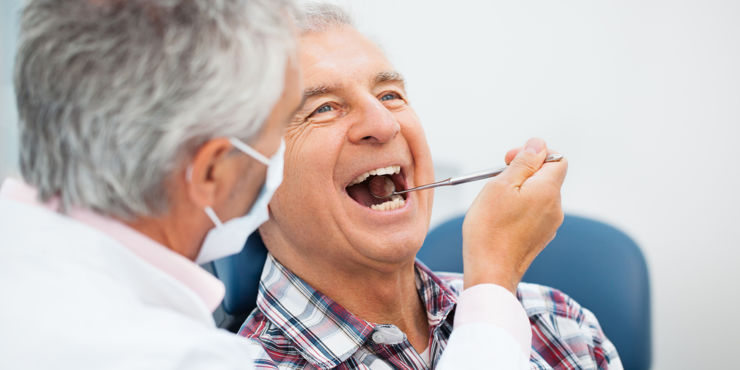ORAL CANCER SYMPTOMS TO WATCH FOR
Oral cancer awareness month is upon us and that means fully understanding the signs and symptoms to watch for. Even though your dentist does screen for oral cancer during your regular preventative care visits, it is important to know what to watch for in between appointments. Screening your mouth on a regular basis for signs and symptoms of cancer should be seen as a similar process to performing an at-home breast or prostate exam for early detection of any pre-cancerous changes. Early detection is the key to the successful treatment/management of all cancers.

UNDERSTANDING ORAL CANCER SYMPTOMS
Oral cancer can occur anywhere in the mouth including the lips, tongue, cheeks, gums, salivary glands, larynx, sinuses, and in the throat.
SIGNS AND SYMPTOMS TO WATCH FOR:
- Persistent mouth sore/s
- Pain in mouth or ear/s
- Chronic hoarseness/sore throat or change in voice
- Non-tender lump in the neck
- Swellings/thickenings, lumps or bumps, rough spots/crusts/or eroded areas on the lips, gums, or other areas inside the mouth
- The development of velvety white, red, or speckled (white and red) patches in the mouth
- Unexplained bleeding in the mouth
- Unexplained numbness, loss of feeling, or pain/tenderness in any area of the face, mouth, or neck
- Persistent sores on the face, neck, or mouth that bleed easily and do not heal within 2 weeks
- A soreness or feeling that something is caught in the back of the throat
- Difficulty chewing or swallowing, speaking, or moving the jaw or tongue
- Ear pain
- A change in the way your teeth or dentures fit together
- Dramatic weight loss
WHO IS AT RISK FOR ORAL CANCER?
Anyone can be affected by oral cancer, but according to the American Cancer Society, men face twice the risk of developing oral cancer as women, and men who are over age 50 face the greatest risk. However, research has shown that mouth cancer is becoming more common in younger patients and in women.
There are also a number of risk factors that may increase your risk of developing oral cancer, including:
- Smoking – Smokers are six times more likely than nonsmokers to develop oral cancers
- Smokeless tobacco users – dip, snuff, or chewing tobacco products are 50 times more likely to develop cancers of the cheek, gums, and lining of the lips
- Excessive consumption of alcohol – Oral cancers are about six times more common in drinkers than in non drinkers
- Family history of cancer
- Excessive sun exposure, especially at a young age.
- Human papillomavirus (HPV). Certain HPV strains are risk factors for Oropharyngeal Squamous Cell Carcinoma (OSCC)
Looking for more information on oral cancer? Learn more about oral screenings at home and the importance of preventative care here.
